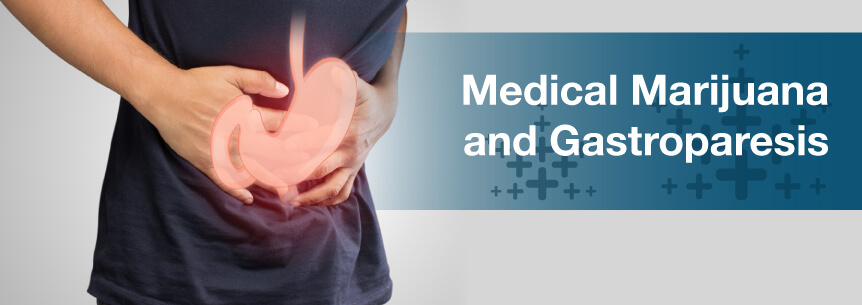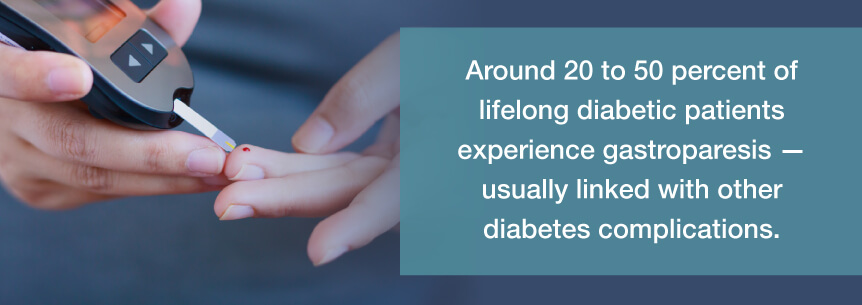
Everyone has had an upset tummy before. However, some people experience severe and chronic nausea and vomiting due to certain conditions such as gastroparesis, and this gets in the way of living a quality life. Thankfully, medical marijuana and gastroparesis treatment is available and could be a good option for you to help ease your nausea, vomiting and other gastroparesis-related symptoms.
Published clinical trials don’t yet exist for marijuana and gastroparesis. However, medical weed successfully alleviates digestive complaints like nausea. People have used cannabis derivatives to treat cancer.
Since people historically have smoked marijuana as their ingestion method, some worry about its potential for addiction and harm, like with tobacco smoke. However, one particular patient claimed he made the switch to cannabis and used a vaporizer to smoke it. He claimed the herb helped him keep his food down and he gained back the weight he lost when he was on the medication Marinol.
Find A Doctor Find A Dispensary
In February 2015, Current Gastroenterology Reports published a review examining cannabinoids and their place in treating gastrointestinal symptoms such as visceral pain, nausea and vomiting. Researchers in the review found targeted cannabinoid therapy could aid in GI disorder/disease management.
The researchers noted endocannabinoid system (ECS) modulation, particularly the cannabinoid CB1 receptors located in the gastrointestinal system, could regulate:
The researchers also noted CB2 receptor modulation typically found in immune system cells, which prevent or help your body recover from injury or sickness, can help:
As noted in the above-published review, cannabis and gastroparesis treatment can help with symptoms such as:
It also helps with anxiety and depression, thereby improving quality of life.
The THC and CBD cannabinoids directly interact with your body’s ECS receptors to affect things such as your appetite, mood, tolerance to pain and more. A little alteration in the amount of CBD and THC in your cannabis allows you to customize your medical marijuana and gastroparesis treatment to effectively help treat your symptoms.

Several states have approved severe nausea as a qualifying condition for the use of medical marijuana.
Certain weed strains to treat nausea effectively. These include:
Other potentially helpful marijuana and gastroparesis strains include:
Along with choosing your cannabis and gastroparesis strain, you also need to decide on the best delivery method. Each delivery method provides its effects. Through trial and error, you’ll be able to find the most suitable method to get the most out of your treatment.
Becoming educated is a great way to begin your marijuana and gastroparesis treatment experience. After you’ve learned all the essentials, you can increase your knowledge about medical cannabis, either through doing further research or by contacting a marijuana specialist.
Once you’re ready, look up your state’s laws on medical weed. Then, it’s time to select a cannabis doctor who works closely with you to find the perfect medical cannabis treatment and continue an ongoing relationship with you. Then choose your dispensary you wish to get your marijuana products from — try out our huge database.
If you’re interested in getting more information on how to use medical weed to treat your gastroparesis or other stomach problems, book your appointment today with one of our recommended cannabis doctors in your area.
Find A Doctor Find A Dispensary
Gastroparesis is a disorder affecting your stomach’s motility, or spontaneous muscle movement. You usually have strong muscle contractions capable of pushing your food through your body’s digestive tract. When you’re suffering from gastroparesis, this motility slows down or might not even work altogether, which keeps your body from being able to empty your stomach properly.
Antidepressants, opioids and other specific medications can cause slow gastric emptying and induce similar symptoms. Allergy medications and high blood pressure can, as well. These medicines can worsen the condition for those with gastroparesis.
Gastroparesis can lead to symptoms such as:
The cause of gastroparesis isn’t clear. In some cases, it’s a diabetes complication, while some individuals develop it following surgery. While there isn’t a cure for the disorder, you can find some relief with medication and dietary changes.
Potential causes of gastroparesis include:
Rare disorders like scleroderma — a connective tissue condition that affects your skeletal muscles, skin, internal organs and blood vessels — may also cause gastroparesis.
There are several ways to categorize gastroparesis.

The incidence of gastroparesis-related hospitalizations in the U.S. significantly increased between 1995 and 2004 — especially after 2000.
With gastroparesis, you may experience:
The symptoms you experience can be severe or mild. Each person’s experience is different.
Several complications can arise from gastroparesis, including the following.
There’s a connection between gastroparesis, poor quality of life and significant psychological distress. Furthermore, symptoms of the condition adversely link with heightened depression and anxiety, as well as impaired quality of life. One study showed the rates of psychopathology in groups of individuals with gastroparesis ranged between 21.8 and 50 percent.

Statistics about gastroparesis, according to the Digestive Diseases Center, include:
To treat gastroparesis, the doctor first needs to identify and treat the underlying condition. For instance, if you have diabetes and it’s causing your gastroparesis, the doctor will give you treatment to help you control diabetes.
Proper nutrition plays a huge role in treating gastroparesis. Many individuals can keep their gastroparesis symptoms under control with simple changes to their diet. Your doctor may give you a referral to a dietitian who works closely with you in finding foods you can digest more easily, so you’re getting enough nutrients and calories from the food. The dietitian may recommend you:
Your doctor may prescribe you medications to treat the disorder, such as stomach muscle-stimulating medications like erythromycin and metoclopramide.

Side effects of erythromycin may include:
Erythromycin can become less effective over time.
Side effects of metoclopramide may include:
Domperidone, a newer medicine, is also available, but it comes with restricted access. It does have fewer side effects, though, which may include:
Your doctor may prescribe you medicine to keep your nausea and vomiting under control, such as diphenhydramine and prochlorperazine.
Side effects of prochlorperazine may include constipation, dizziness, anxiety, drowsiness, weight gain and more. Diphenhydramine may have side effects as well, such as drowsiness, dizziness, loss of coordination, dry eyes, upset stomach, blurred vision and more.
Finally, there’s another class of medications to help with nausea and vomiting. One example is ondansetron. Side effects may include:
Some gastroparesis patients cannot tolerate any liquids or food. In these circumstances, the doctor will likely suggest inserting a feeding tube into your small intestine. They may also suggest a gastric venting tube that works by relieving gastric pressure.
The doctor can insert the feeding tube through your skin directly into your small intestine, or pass it through your mouth or nose. It’s typically temporary and only necessary if you can’t control your blood sugar levels with another method or if your gastroparesis is severe. Some individuals have to have the feeding tube through an IV going directly into their abdominal area and into a vein.
Some people benefit from alternative treatments, but there aren’t a lot of studies on these. A few alternative treatments include the following.